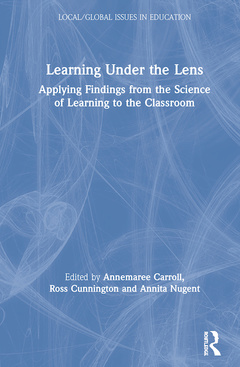Description
Learning Under the Lens
Applying Findings from the Science of Learning to the Classroom
Local/Global Issues in Education Series
Coordinators: Carroll Annemaree, Cunnington Ross, Nugent Annita
Language: English
Subject for Learning Under the Lens:
Keywords
Educational Neuroscience; Science of Learning; Electrodermal Activity; Education Research; Common Language; Education Theory; LTP; Education Policy; Research Translation; Education Practice; Special Research Initiative; Theory of Learning; Social Emotional Learning; Authentic learning settings; High Ma; UNESCO International Bureau; Education system; Low Control Beliefs; Neuroscience; Arc; Prime Minister's Science; Disengaged; Massive Open Online Courses; Face To Face; Sel Program; Translation Framework; MA; Left Superior Temporal Gyrus; Ventral Anterior Cingulate Cortex; Effective Feedback Practice; Research Practice Gap; IBE; Feedback Intervention; Pre-service Primary Teachers
Publication date: 12-2020
· 15.6x23.4 cm · Hardback
Publication date: 12-2020
· 15.6x23.4 cm · Paperback
Description
/li>Contents
/li>Readership
/li>Biography
/li>
Learning Under the Lens: Applying Findings from the Science of Learning to the Classroom highlights the innovative approach being undertaken by researchers from the disparate fields of neuroscience, education and psychology working together to gain a better understanding of how we learn, and its potential to impact student learning outcomes.
The book is structured in four parts: ?Science of learning: a policy perspective? sets the scene for this emerging field of research; ?Self regulation of learning? and ?Technology and learning? feature findings by eminent international and national researchers in the field and provides an insight into some of the innovative research illustrating the depth, breadth and multi-disciplinarity of the research; and ?Research translation? focuses on the scaled-up implementation of research findings in authentic learning settings, and showcases research findings which are having impact in learning environments.
This fascinating book is intended as a reference tool to create awareness among researchers, policy makers, and education practitioners of the research being undertaken in the science of learning field and its potential to impact student learning outcomes.
Prologue The ‘Science of Learning’: Birth or Renaissance; Part 1: Science of Learning: A Policy Perspective 1. Science of Learning: An International Perspective 2. National Efforts in the Science of Learning: Case Reports from United States, Australia and Brazil 3. Creating an Impact, Leaving an Impression: Learnings from the Australian Science of Learning Research Centre; Part 2: Self Regulation of Learning 4. Neuroplasticity: From Cells to Circuits and Brains Towards the Classroom 5. Foreign Language Anxiety: Translating Cognitive Neuroscience to the Classroom 6. Addressing Mathematics Anxiety in Primary Teaching 7. Innovative Approaches to Measure and Promote Emotion Regulation in the Classroom from a Science of Learning Perspective 8. Building a Secure Learning Environment Through Social Connectedness 9. The Master™ Focus Program: A Theoretically Informed Meta-Attention Intervention for Early Adolescence; Part 3: Technology and Learning 10. Design for Learning in An Age of Rapidly Evolving Technology 11. Digital Learning Environments, the Science of Learning and the Relationship Between the Teacher and the Learner; Part 4: Research Translation 12. Research to Reality: Feedback Coaching – Building Teacher Capability to Improve Learning Outcomes 13. Translating the Science of Learning Through Co-Design: Working with Teachers to Prioritise Executive Functioning Skills in Mathematics Education 14. Developing a Model for the Translation of Science of Learning Research to the Classroom; Discussant Chartering New Waters in the Science of Learning: Reflections on the Emergence of the Science of Learning in Australia and Its Place on the International Landscape by An Outside Insider
Annemaree Carroll is Professor in Educational Psychology at The University of Queensland and Chief Investigator and Co-ordinator of Translational Outcomes within the Australian Research Council – Special Research Initiative, Science of Learning Research Centre.
Ross Cunnington is Professor in Cognitive Neuroscience at The University of Queensland and Deputy Director of the Science of Learning Research Centre. In 2016 Ross was appointed as an Honorary Senior Neuroscience Fellow by the International Bureau of Education, UNESCO.
Annita Nugent is the Manager of Research Translation with the Science of Learning Research Centre.




